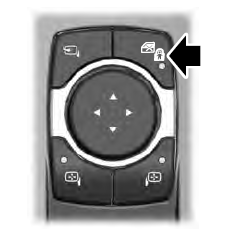Lincoln Aviator 2020-2026 Service Manual / Powertrain / Engine / Engine Cooling - 3.0L EcoBoost / Removal and Installation - Thermostat
Lincoln Aviator: Engine Cooling - 3.0L EcoBoost / Removal and Installation - Thermostat
Special Tool(s) / General Equipment
| Hose Clamp Remover/Installer |
Removal
NOTE: Removal steps in this procedure may contain installation details.
-
Drain the cooling system.
Refer to: Engine Cooling System Draining, Vacuum Filling and Bleeding (303-03A Engine Cooling - 3.0L EcoBoost, General Procedures).
-
Remove the air cleaner.
Refer to: Air Cleaner (303-12 Intake Air Distribution and Filtering - 3.0L EcoBoost/3.0L EcoBoost – Hybrid (BQ), Removal and Installation).
-
-
Detach the coolant hose retainers.
-
Release the clamps and disconnect the coolant hoses.
Use the General Equipment: Hose Clamp Remover/Installer
-
Remove the bolt and position the degas bottle aside.
Torque: 44 lb.in (5 Nm)
-
Detach the coolant hose retainers.
.jpg) |
-
NOTICE: Cover the accessory drive belts to prevent coolant contamination of the belts.
Completely cover the accessory drive belts with waterproof plastic.
-
Loosen the clamp and disconnect the upper radiator hose.
Torque: 44 lb.in (5 Nm)
.jpg) |
-
-
Detach the coolant hose retainer.
-
Remove the bolts and the air cleaner support bracket.
Torque: 93 lb.in (10.5 Nm)
-
Detach the coolant hose retainer.
.jpg) |
-
Remove the bolts and disconnect the coolant outlet connector.
Torque: 89 lb.in (10 Nm)
.jpg) |
-
NOTE: The thermostat vent valve should be on top.
NOTE: During installation verify the thermostat vent hole is at the 12 o'clock position.
Remove the thermostat. Inspect the O-ring seal and replace it if necessary.
.jpg) |
Installation
-
Install a new O-ring seal and lubricate it with clean engine coolant.
Refer to: Specifications (303-03A Engine Cooling - 3.0L EcoBoost, Specifications).
-
To install, reverse the removal procedure.
-
Fill and bleed the cooling system.
Refer to: Engine Cooling System Draining, Vacuum Filling and Bleeding (303-03A Engine Cooling - 3.0L EcoBoost, General Procedures).
 Removal and Installation - Radiator
Removal and Installation - Radiator
Removal
NOTE:
Removal steps in this procedure may contain installation details.
Remove the cooling module.
Refer to: Cooling Module (303-03A Engine Cooling - 3...
 Removal and Installation - Transmission Fluid Heater Coolant Control Valve
Removal and Installation - Transmission Fluid Heater Coolant Control Valve
Special Tool(s) /
General Equipment
Hose Clamp Remover/Installer
Removal
WARNING:
When releasing the cooling system pressure, cover the coolant expansion tank cap with a thick cloth...
Other information:
Lincoln Aviator 2020-2026 Service Manual: Description and Operation - Main Control Valve Body
Item Description 1 Internal wiring harness retaining bolt 2 Internal wiring harness 3 Park lock pawl solenoid 4 Solenoid retaining plate bolts 5 Solenoid retaining plate 6 TCC solenoid 7 LPC solenoid 8 Shift solenoid retaining plate bolts 9 Shift solenoid retaining plate 10 SSD 11 SSE 12 SSB 13 SSC 14 SSF 15 SSA 16 TFT 17 Valve channel plate bolts 18 Valve channel plate 19 Lower-to-upper valve body bolts 20 Lower valve body 21 Upper valve body 22 Valve body dowel pins Lower Valve Body 1 Valve body separator plate bolts 2 Valve body separator plate 3 TCC damper 4 LPC damper assembly 5 Check valve assemblies 6 Check balls (quantity 5) 7 LPC anti-backflow valve assembly 8 TCC priority valve assembly 9 Park lock pawl valve 10 A clutch control valve 11 SSA 12 F clutch control valve 13 SSF 14 C clutch control valve 15 SSC 16 B clutch control valve 17 SSB 18 E clutch control valve 19 SSE 20 D clutch control valve 21 SSD 22 Shift solenoid retainers Upper Valve Body 1 Lube control valve assembly 2 Plug and spring assembly 3 C clutch latch valve assembly 4 B clutch latch valve assembly 5 F clutch latch valve assembly 6 A clutch latch valve assembly 7 Plug and spring assembly 8 TCC regulator valve assembly 9 Main regulator valve assembly The main control consists of a upper and lower valve body with solenoids that are controlled by a remote mounted TCM or the PCM...
Lincoln Aviator 2020-2026 Owners Manual: Understanding Your Tire Pressure Monitoring System
The tire pressure monitoring system measures pressure in your road tires and sends the tire pressure readings to your vehicle. You can view the tire pressure readings through the information displa. The low tire pressure warning light will turn on if the tire pressure is significantly low...
Categories
- Manuals Home
- Lincoln Aviator Owners Manual
- Lincoln Aviator Service Manual
- Resetting the System
- Locking and Unlocking
- Changing the Front Wiper Blades - Vehicles With: Heated Wiper Blades
- New on site
- Most important about car
Child Safety Locks
When the child safety locks are set, you cannot open the rear doors from the inside.

The child safety lock control is on the driver door.
Press the control to switch the child safety locks on. Press the control again to switch them off. A light on the child safety control illuminates when you switch them on.
Copyright © 2026 www.liaviator2.com
